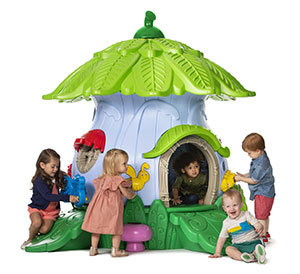Photo by House Committee on Education and the Workforce Democrats via Flickr, Creative Commons |
You see your kid with bruises, strained muscles, and ligament sprains; no parent would want to see their kids in that state right? And yet they push their kids to playing contact sports such as football. Being one of the biggest sports loved and watched by numerous families, parents think highly of football, even playground football, as a sport of a real man.
However, being a contact sport with the intention of hitting your opponent, the serious injuries in playground football could land your son to a hospital in an instant. Is there any way to pamper your child into a safe football playground without all the sports injuries? Should kids be allowed to play a harmful sport as such?
Playground Injuries And Playground Safety
In a recent NBC News/Wall Street Journal poll, 40 percent of parents agreed that football is not safe for kids. "As a parent, I didn’t want my 7- or 8-year-old kid walking off the field with a broken arm or leg,” said Tom Brady Sr., father of New England’s star quarterback who strongly believed that football was too dangerous for children. Well, it seems that football has its fair share of fans and critics. Indeed, not everyone is a fan of football especially if the safety of their kids is on the line.
Apparently, apart from being the number one sport in America played by children as young as 10 years old, football also tops the list of causing the most number sports injuries in the playground. When your child reaches the ages 5 and up, that’s the time he develops his likeness to explore and try new things such as playing football in playgrounds thus having a higher risk of accidents. Last year, USA Football showed a partial result of their study showing that 10 percent of youth football players are injured. Last 2007, a study by the US Consumer Product Safety Commission revealed that 920,000 athletes aged under 18 suffered football-related injuries. Further studies reported in the Journal of Athletic Training presented that each year, out of the 5.5 million football player aged 5 to 14, 28 percent incur a playground injury. The reported playground injuries occur during playground football practices and games some of which cause traumatic injuries like concussion. Does this mean that playgrounds are too dangerous for your kid?
Photo by captrosha via Flickr, Creative Commons |
The risks that come with playing football is definitely high. Playground injuries among kids however, suffer lesser risk than adults. This is due to the lesser force being exerted by younger players compared to adult players. In short, the younger the player, the lighter the injury. If you play the sport, it is understood that having a football accident on a playground is always possible. Even with the lighter injury and the protective equipments, parents take every injury seriously. But, there are certain ways to ensure playground safety for your little football star:
- First aid kits should come first before anything else.
- Wear the proper playground football gear, clothing, and have the right equipment.
- Check the playground for unsuitable playground equipments or those which need proper maintenance.
- Adapt your body and get in top shape before the game starts. If you’re just preparing for a practice game, make sure you get warmed up before the game starts.
- Make sure to hydrate and replenish all the water from your body.
- Have the proper rest period during games and in-between every practice.
Football Fever In The US
Dating back to as far as 1869, football was far from addicting to the local Americans. Apparently, the title “America’s Pastime” used to be for baseball and now, the weird game of football got the title. What happened in between that football became every American household’s desired disease?
In an article titled “We Are Addicted to Football. It's Time for Rehab.” published in newrepublic.com, author Marc Tracy wrote that “football was funky and weird.” Accordingly, the coliseum was not even half-full and yet now, people are killing each other to get in and watch the tasty Super Bowl. Crazy as it may seem, Tracy explained that baseball was “America’s Pastime,” back then.
Photo by Matt Woolner via Flickr, Creative Commons |
The article further explained that the ascendance of football or playground football as the “national sport” should be blamed on the media. Why not? It has always been the media who dictates the trends happening in, out, and about the nation from fashion and yes, up to sports. Besides, the media feeds only the desires of the public and football was the disease desired by every sports fan. The sport became too big that even the draft coverage was followed by every American family. Until recently, sports headlines have presented the growing concern of parents toward the concussions and head trauma suffered by most youth athletes.
Kids Talk: Playground Football And The Love-Hate Relationship
“I remember the smell of sweat, liniment and the heat that came off my dad and his mates. I was immersed in football...But, I fucking hated football. Kicking a football seemed such a mind boringly dumb thing to do. One Saturday, Jimmy Greaves nearly took my face off and knocked me over during a heavy tackle that pinned him to the fence I was leaning over. Why didn’t I move as this herd of power grunting and cursing came hurtling towards me and nearly took my head off? I wasn’t paying any attention. I was looking at the green grass,” said a Mr. Taxi Man in a confession published in Sabotage Times.
Other kids hated football and that’s a fact. Growing in the middle of all the football fuss and mania does not necessarily rally towards loving and playing football. While other kids love the concept of violence and strength in the sport, other kids find this equally disturbing. Tracy explained that football sets a bad example by treating its athlete more cruel than any other sport. If football is such an awful sport, how was it able to stand the test of time? Like any other sport, football has its positive and negative effects. It opens a lot of opportunities and even works as a bonding experience for every American family.
- Teamwork. Football is a teamsport which enables socialization. Most parents see group sports as a way to initiate group work and have their child gain a strong sense of camaraderie among the team. As a team, children are given their own tasks which require each player to take full responsibility to achieve a common goal.
Photo by captrosha via Flickr, Creative Commons |
- Healthy Lifestyle. As an athlete, they are required to live a healthy lifestyle focusing on strength, stamina, speed, and agility. Most of the time, these athletes are required to practice even during the off-season. If you want your child to stay in good shape, then let your child play football.
- Win And Lose. It’s not all about the glory of having a great body and winning the championships, sometimes it’s the lesson of accepting defeat in a cool way. Football teaches your child the values of accepting defeat and getting back to the field and live to try again.
- High-risk Of Injuries. Football players are aware of the high risk of playground injury that comes with playing the sport. There may be protective gears and clothing, along with the tedious exercise, but there is always a risk of an accident. Even with the safety precautions, athletes still suffer from scrapes, bruises, cuts, sprains, dislocations, a few broken bones here, and concussions there; this does not apply to football alone, even basketball could do this to athletes.
Photo by courteney via Flickr, Creative Commons |
- Lack Of Academic Time. Another major disadvantage of playing football among the youth is the divided attention of the child. Most children focus more on football hoping to become a professional player someday that they put their academics aside. What they do not know is that in the long run, this affects their overall career growth and even chances of getting to play in the major leagues.
True enough, football has earned its place in the hearts of every family, may it be based solely by the media’s influence, the lack thereof, or simply their innate hobby. Parents should encourage this sport and support their children in every way possible. There’s always another side of the coin and everything else follows. Instead of discouraging your child to play football, make sure to put playground safety first, and increase their awareness over the danger and injuries that comes with playing the sport.
Learn about the author: Jennifer Holmes






